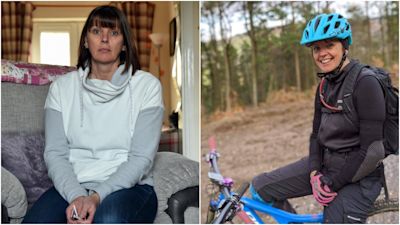Sports instructor's life 'ruined' as suspected 'long Covid' leaves her struggling to walk and tell her children apart

A sports instructor from Bridgend said she struggles to walk and even tell her children apart at times because of a suspected coronavirus infection nine months ago.
Sarah Wakefield, from Bridgend, said 'long Covid' has "absolutely ruined" her. Long Covid is the name given to lasting symptoms that continue to impact someone after they have contracted coronavirus.
The 46-year-old used to spend hours cycling and exercising every day as part of her job but now, even a flight of stairs is a struggle.
She has set-up a support group for people in Wales who are experiencing long-term side effects after having coronavirus. Her group, and sister organisations across the UK, are calling for the creation of specialist centres to treat and diagnose the condition.
Sarah attributes the symptoms she experiences to a suspected coronavirus infection in March of this year.
Before that, Sarah said she was "very, very fit", ran a mountain bike guide business and worked as a water-sports instructor.
A normal working day used to involve her riding a mountain bike up and down the Afan Valley for up to five hours.
Months later, Sarah is living a very different lifestyle. Arthritis, 40% hearing loss and shortness of breath mean she can no longer work.
She also experiences "brain fog" which leaves her disorientated, admitting that sometimes it is so severe she finds herself unable to tell which of her three children she is looking at.
Sarah is worried she will never get back to where she used to be and it is affecting her children too.
"I went for a walk for the first time in weeks yesterday and I was really struggling with pain my knees and my heart rate went right up," she said.
"I'm not convinced I'll ever get back to how I was before.
"It's really hard on the girls as well, they ask sometimes if we can do certain things and I have to say no because I'm too unwell. We used to go hiking but I can't do it anymore.
Sarah also has to now wear hearing aids after developing Meniere's disease, a disorder of the inner ear that can lead to dizzy spells, vertigo and hearing loss.
She claims that Covid-19 has "absolutely ruined" her and the more time that goes by, the more she becomes "housebound".
Although she was never tested for coronavirus, Sarah believes it could not have been anything else.
Just a week after the first lockdown began in March, Sarah said one of her daughters came home with "a bit of a cough". Sarah herself then developed a week's-worth of "headaches from hell".
This progressed to chest pains and breathing problems, for which a GP prescribed several courses of antibiotics. Sarah claims they "didn't work" and her breathing became more shallow and painful.
At one point, Sarah had to go to hospital with a suspected clot in her lungs but doctors could find no evidence to support that.
Long Covid is not a recognised medical condition yet but Sarah is hoping that will change.
Her long Covid support group believes that diagnosis of the condition is necessary to effectively support a number of people who are reporting serious lasting effects after contracting Covid-19.
Sarah said: "We need diagnosis, not rehab. I've got something wrong with my heart at the moment but the waiting list for the cardiologist is really long.""If a rehab centre told me to increase my exercise I might drop dead at the end of the road. We need neurologists, cardiologists and respiratory specialists to diagnose rather than me just plaguing my GP who can only treat each symptom individually."They're only able to put sticking plasters on me at the moment."
A Welsh Government spokesperson said: "We are continuing to learn more about what the National Institute for Health and Care Excellence is calling post-Covid syndrome, including from research and people’s experiences.
"We know people are experiencing a range of longer-term difficulties and while every person is different, these include fatigue, breathlessness, pain and cardiac, respiratory and neurological issues."We want people with post-Covid syndrome to be able to access the majority of the services they need – be that assessment, diagnosis, treatment and rehabilitation support – as close to home as possible or via remote services, only having to travel for more specialised services, which have to be provided in an acute hospital setting."Each health board is responsible for planning and organising the response for their area taking into account local needs and circumstances."